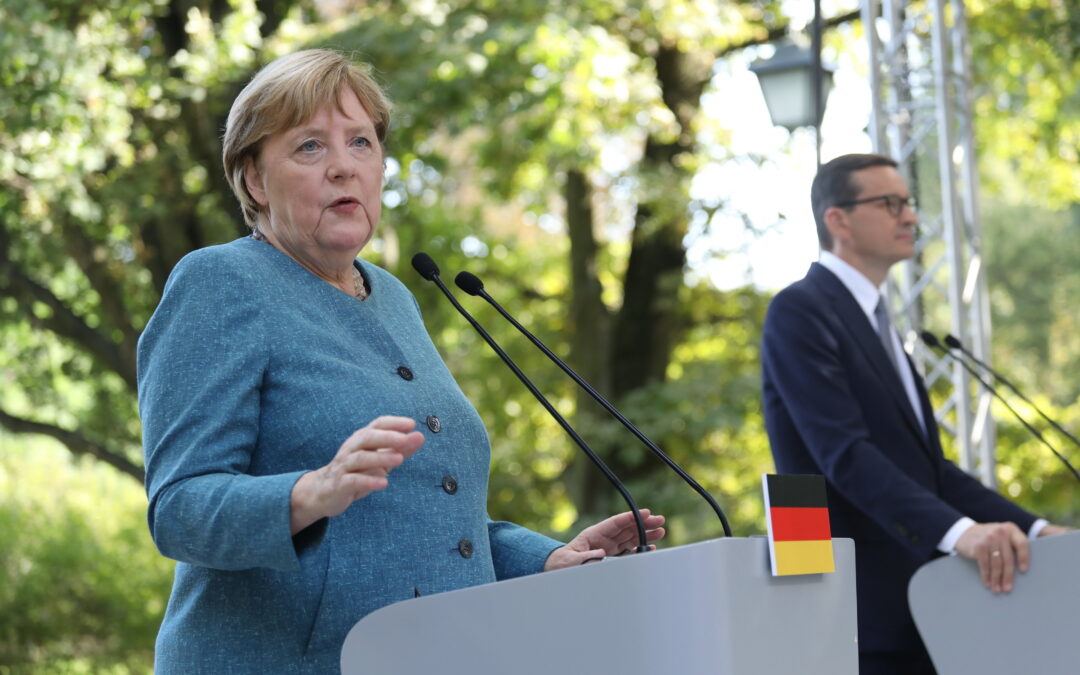Angela Merkel has endorsed Poland’s response to a surge in crossings at its border with Belarus. Speaking during her final state visit to Warsaw, the outgoing German chancellor also called for further “dialogue” to resolve the Polish government’s dispute with Brussels over the rule of law.
Her visit comes amid what many commentators see as a low point in recent German-Polish relations, with disagreements in a number of areas, including over Berlin’s support for the Russian Nord Stream 2 gas pipeline, an issue that Merkel addressed today.
Though Merkel held talks with Prime Minister Mateusz Morawiecki, there was some controversy over the fact that President Andrzej Duda failed to meet her, despite a reported request from the German side. Duda’s office said that he had a long-scheduled commitment to attend an event elsewhere today.
Chciałbym podziękować Pani Kanclerz za okres wartościowej współpracy pomiędzy naszymi narodami, pełen sukcesów gospodarczych, wielkiego wzrostu wzajemnej wymiany handlowej, naukowej i wzmocnienia więzów europejskich. 🇵🇱🤝🇩🇪 🇪🇺https://t.co/1XhYdjSNbA pic.twitter.com/GuaH9adiYM
— Mateusz Morawiecki (@MorawieckiM) September 11, 2021
“Europe must do more for its security,” said Merkel in Warsaw, quoted by Onet. “We see hybrid attacks on the eastern border, pressures in the form of refugees. We must help humanely and at the same time we must protect the external borders of the European Union.”
Her remarks echo the language of Poland’s government, which has described the recent surge in illegal crossings from Belarus by people from the Middle East, Africa and Asia as part of a “hybrid war” by Minsk against the EU. Lithuania and Latvia, as well as the European Commission, have made similar claims.
Speaking alongside Morawiecki, Merkel appealed to Belarus to provide “help and protection” to the migrants. “I find it completely unacceptable that such hybrid attacks are carried out with these people,” she said, adding that she had told the same to Russian President Vladimir Putin, an ally of Minsk.
Morawiecki expressed satisfaction that Poland and Germany now had “positions significantly closer” on this issue than in the recent past, reports the Polish Press Agency (PAP). “We have the full support of the European Commission, and also the German government, to defend Europe from illegal immigration.”
The German chancellor confirmed that she had spoken about the rule of law with her Polish counterpart. Poland has this week faced further action from the European Commission over its disciplinary regime for judges, with Brussels seeking financial penalties against Warsaw.
Merkel said that she is “committed to resolving [such] issues through dialogue, and I think there is scope for such progress”. She noted that the Polish government has already been in talks with the European Commission, whose vice president Věra Jourová recently visited Warsaw.
During her visit, Merkel laid a wreath at Warsaw’s Tomb of the Unknown Soldier. “Countless Polish soldiers lost their lives as a result of German crimes,” tweeted the German ambassador, Arndt Freytag von Loringhoven. “We pay special tribute to their memory.”
Both Merkel and Morawiecki also emphasised the importance of economic ties between their two countries, which have been strengthening in recent years. The Polish prime minister argued that, “for the EU to be an important global player, it must be economically strong”, reports Business Insider Polska.
In an interview with Frankfurter Allgemeine published today, Morawiecki declared that, “if the EU is to survive, if it is to be strong, it must be a union of sovereign states, a Europe of homelands that respect their traditions and cultures. But at the same time, it should cooperate very closely economically”.
W ramach swojej wizyty kanclerz federalna Angela Merkel złożyła dzisiaj wieniec przy Grobie Nieznanego Żołnierza. Niezliczeni polscy żołnierze w służbie ojczyźnie stracili życie w wyniku niemieckich zbrodni. Składamy szczególny hołd ich pamięci. pic.twitter.com/sNJIrSyPGl
— Arndt Freytag von Loringhoven (@Amb_Niemiec) September 11, 2021
However, two areas of continued divergence are over climate policy and Russia. Morawiecki emphasised that Poland, which is the EU’s most coal-reliant country, must be allowed to follow “our own path” towards the bloc’s climate goals. He added that green policies should not disadvantage European firms against foreign rivals.
Asked about the Nord Stream 2 pipeline, construction of which was completed this week, Merkel said that Germany is “committed to ensuring that gas supplies are guaranteed” for Ukraine. Poland has expressed concern that the pipeline bypasses eastern Europe, allowing Moscow to put pressure on Ukraine.
“We support Nord Stream 2, but we need safeguards to prevent political pressure from occurring,” said the German chancellor. Morawiecki noted that he had made clear Warsaw’s view on how the pipeline impacts on “the security of this region”.
It had initially been reported that Merkel would meet with Duda during her visit. However, on Thursday, following press speculation, the president’s office confirmed that a meeting would not take place as Duda had in July committed to attending a commemorative event in the city of Katowice today.
“The chancellor would like to see him, but she fully understands,” said German government spokesman Steffen Seibert, quoted by Onet. Some reports in Polish media, however, suggested that the situation was the result of a diplomatic dispute.
Duda did speak by telephone yesterday with his German counterpart, Frank-Walter Steinmeier. Afterwards, Polish presidential aide, Jakub Kumoch said that the two sides “have the same position” on the border crisis and both “unequivocally condemn the actions” of Belarus.
Main image credit: Maciek Jazwiecki / Agencja Gazeta

Daniel Tilles is editor-in-chief of Notes from Poland. He has written on Polish affairs for a wide range of publications, including Foreign Policy, POLITICO Europe, EUobserver and Dziennik Gazeta Prawna.




















